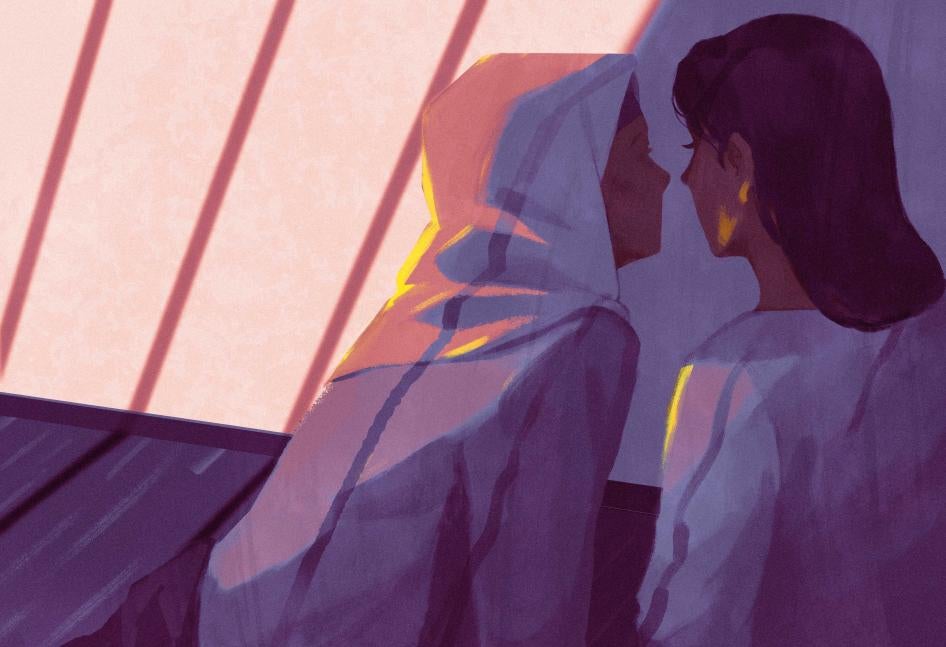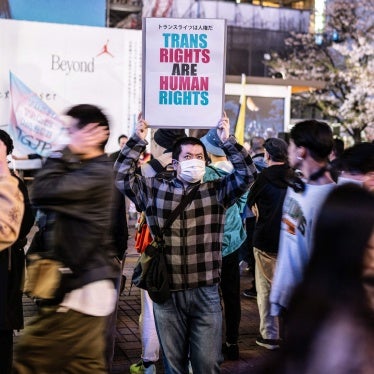(Kuala Lumpur) – Persistent Malaysian government-sponsored discrimination threatens the rights of lesbian, gay, bisexual, and transgender (LGBT) people in Malaysia, Human Rights Watch and Justice for Sisters said in a report released today. The government should decriminalize same-sex conduct and gender diversity, and should discontinue programs and rhetoric suggesting that LGBT people should be “rehabilitated” or “cured.”
The 71-page report, “‘I Don’t Want to Change Myself’: Anti-LGBT Conversion Practices, Discrimination, and Violence in Malaysia,” documents that government officials have fostered a hostile climate in which LGBT and gender diverse people face discrimination and punishment because of their sexual orientation or gender identity. Human Rights Watch and Justice for Sisters examined how criminal penalties, conversion practices that seek to change people’s sexual orientation or gender identity, and anti-LGBT rhetoric from government officials all undermine LGBT people’s basic rights.
“Malaysia’s current rehabilitation and criminalization approaches to LGBT people are based neither in rights nor evidence,” said Thilaga Sulathireh, co-founder of Justice for Sisters. “The programs, while framed as compassionate, internalize societal and structural discrimination and foment self-hatred among LGBTQ and gender diverse persons and hostility among the rest of the population.”
Human Rights Watch and Justice for Sisters interviewed 73 LGBT people in Malaysia between 2018 and 2021, including people living in Kuala Lumpur, Selangor, Negeri Sembilan, Kelantan, Penang, Pahang, and Kedah, along with journalists, human rights practitioners, lawyers, and other informed sources.
Malaysia’s federal penal code punishes oral and anal sex with up to 20 years in prison, with mandatory whipping. Each state and the federal territories of Kuala Lumpur and Putrajaya also have Sharia – Islamic law – codes in place that typically criminalize same-sex activity as well as gender nonconformity via laws that prohibit “a man posing as a woman.”
The government has also funded retreats, known as mukhayyam, that aim to “rehabilitate” or change LGBT people. As of June 2021, at least 1,733 people had attended these programs, the government reported. These programs jeopardize the equality, dignity, and rights of those who attend them, but also send a dangerous message to the wider public that LGBT people can and should change their sexual orientation, gender identity, and gender expression.
In recent years, the government has also shut down events and programming designed to promote LGBT rights and has censored content about LGBT people in music and films. Universities have also stifled LGBT awareness raising programs and have provided platforms and support for anti-LGBT messages and programming.
LGBT people interviewed said that the environment in Malaysia was becoming increasingly hostile. An activist in Kuala Lumpur said, “We are regressing, in many aspects, as conservative strand of Islam becomes dominant in shaping the politics and policies that dictate the lives of the country’s citizens including LGBT persons.” He said, “Scapegoating transgender persons has become a tactic applied by ultra conservative and nationalist politicians,” and that “The exploitation of societal homo/transphobia has proven a convenient way to divert public attention away from government failure to address pressing social issues and rising inequalities.”
“The government’s use of the law to criminally prosecute LGBT people is only part of the story in Malaysia,” said Kyle Knight, senior LGBT rights researcher at Human Rights Watch. “Pervasive antipathy toward sexual and gender diversity influences law enforcement, judicial outcomes, family behavior, and public discourse in media toward and about LGBT people.”
In a high-profile case in 2021, Nur Sajat, a transgender woman and cosmetics entrepreneur, failed to appear in court in the western Malaysian state of Selangor to answer to criminal charges for “insulting Islam” based on her attire. The state’s religious department issued a warrant for her arrest and announced that it had mobilized 122 religious affairs officers to hunt her down.
Months later, when Nur Sajat resurfaced in neighboring Thailand, Malaysia sought her extradition, insisting that Sajat need not worry: the massive deployment of law enforcement and diplomatic wrangling to force her back to Malaysia was intended not to “punish” but rather to “educate” her. After a public outcry in her defense, Thailand allowed Sajat to stay in the country under the protection of the United Nations High Commissioner for Refugees, and eventually to settle in Australia.
Nur Sajat’s case illustrates the extent to which authorities in Malaysia are willing to go to enforce the rigid and discriminatory gender norms by which they compel all Malaysians to abide, Human Rights Watch and Justice for Sisters said.
Lawmakers at the federal and state levels should decriminalize same-sex conduct and gender diversity, Human Rights Watch and Justice for Sisters said. Officials should also immediately stop supporting programs that seek to “rehabilitate” LGBT people and should publicly affirm the equality and dignity of LGBT people. To more fully protect the human rights of LGBT people, lawmakers should also take steps to prohibit discrimination based on sexual orientation and gender identity, allow transgender people to update their identity documents, and address bullying against LGBT students and other vulnerable groups in schools.
The Malaysian government should immediately stop sponsoring, funding, and otherwise supporting conversion practices and should, in consultation with LGBT community groups, educate public officials, including police, judges, and government staff, on gender, diversity, and human rights. The government should also promptly repeal laws that discriminate on the basis of sexual orientation and gender identity.









